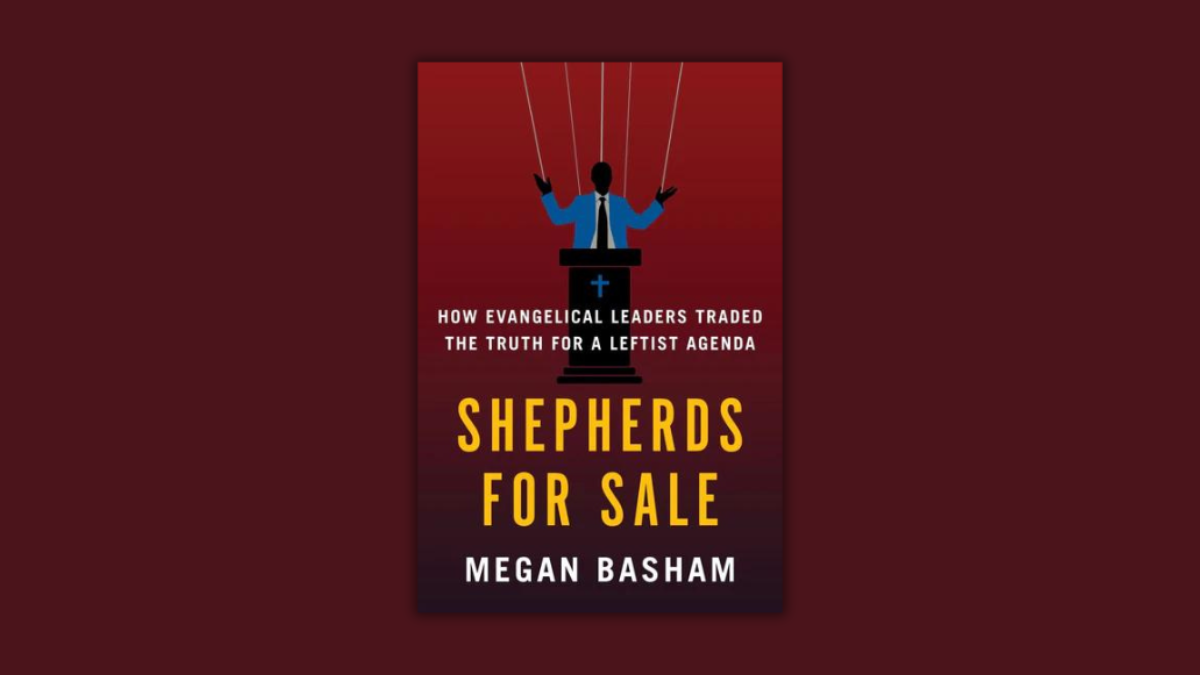Amid an ongoing — and at times heated — debate on social media, former Southern Baptist Convention President J.D. Greear is among several dozen individuals named in a contentious new book, “Shepherds for Sale” by author Megan Basham.

“How Evangelical Leaders Traded the Truth for a Leftist Agenda” is the subtitle of Basham’s book, published by the Broadside Books imprint of HarperCollins on July 30.
Reflecting the “wokeism” debate in contemporary culture, Basham writes in the hardbound book’s dust jacket that “in recent decades … well-funded forces from outside the church have been sowing seeds of discord from behind the scenes … to co-opt the church for political purposes.”
In addition to Greear, who led the SBC from 2018 to 2021, serving a third term amid the COVID-19 crisis, others in Basham’s crosshairs are former World Magazine editor Marvin Olasky; Russell Moore, former president of the SBC’s Ethics & Religious Liberty Commission and now editor of Christianity Today; the late New York City pastor Tim Keller; Veggie Tales creator Phil Vischer; Francis Collins, former director of the National Institutes of Health; and Gavin Ortlund, author, speaker and theologian-in-residence at Immanuel Nashville in Tennessee.
Greear, in a lengthy response to the book, noted, “… we serve a God of truth and if the errors regarding me in this book are any indication of its broader accuracy, then the reader should be cautious about taking her claims at face value.”
He is not alone in stepping forward to counter Basham’s assertions and narratives. Among others: Warren Cole Smith, president of Ministry Watch, an organization founded in 1998 that describes itself as an advocate for transparency, accountability and credibility of Christian ministries.
Yet, Greear, Smith and others credit Basham for asking hard questions of evangelical leaders.
“Basham is asking many vital questions,” Greear wrote in his response to her book. “Personally, I need them. If ‘love of this present world’ corrupted some of the Apostle Paul’s companions, it can certainly happen to me, too. As iron sharpens iron, challenging questions help us see where we lack courage or fail to communicate with clarity.”
Even so: “I believe this can be done while honoring truth and treating one another with charity, befitting the Savior whose name we bear.”
Greear, in his Aug. 12 response to Basham, addressed several issues she raised in the book, including homosexuality, race, Black Lives Matter and ethnic diversity, and he listed SBC politics, The Summit Church he leads in Raleigh-Durham, North Carolina, and the COVID-19 vaccine as additional concerns from the book.
Standing by her claims
Basham issued a lengthy response to Greear the next day, maintaining that “nothing Greear brought forth is in error” in her book.
Basham had singled out a sentence in her book from one of Greear’s sermons in early 2019: “The Bible appears more to whisper on sexual sin compared to its shouts about materialism and religious pride.”
The sentence, in a sermon from Romans 1:24–32 on “How the Fall Affects Us All,” caught the attention of several bloggers, while complaints were voiced by the LGBTQ+ community over the sermon in general. Greear fielded questions about the sentence from time to time but decided to publicly apologize and clarify it on his blog during a controversy in June 2021 involving the use of his sermons by the SBC’s new president, Ed Litton, in his Mobile, Alabama, church.
In Romans 1, Greear had noted, the Apostle Paul set forth the wide manifestations of human sin, and that “Paul is not just randomly picking on homosexuality here. He is citing it as one of the clearest examples of elevating our desires over the Creator’s design in which we say, ‘It’s not about what the Creator wants; it’s about what I want.’”
Turning to abortion, Greear stated, “In many ways, at the bedrock of the pro-choice agenda is a commitment to protect idolatry: I want to be the one, instead of God, who determines the life or death of the baby based on how it affects me.”
Repentance is the same “for a gay, straight, rich, poor, young, old, Jew, Gentile, black or white,” Greear said, capsulized in a prayer: “God, I’m sorry for elevating my desires over your will. I’m sorry for attempting to define my identity apart from your design for me. … I’m sorry for seeking satisfaction in self-fulfillment rather than from giving glory to you. I recognize Jesus is Lord and turn over control to him.”
Greear added, “No one at Summit that day and no one familiar with my ministry thought I was minimizing the sin of homosexuality or encouraging anyone else to do so.”
Basham, in her response to Greear, wrote that “the full context of the passage in my book shows that I was not accusing Greear of reversing his position on homosexuality but reversing his position on whether one should whisper about it as a sin. I stressed that it is important for the church not to whisper about this issue because the culture is not whispering about it.”
A professor’s ‘awakening’
In straight-up support for Basham, Mark DeVine, associate professor of divinity at Samford University’s Beeson Divinity School in Birmingham, Alabama, wrote that her book “should be viewed by rank-and-file Southern Baptists as an important gauge of our denomination’s spiritual state and of these leaders’ fitness to continue to serve at the highest levels of our Convention.”
DeVine’s Aug. 13 blog was posted at the Center for Baptist Leadership, a new conservative organization envisioning “a future where Baptists lead American evangelicals back to a confident, convictional, and hopeful Christ-filled future, both in America and worldwide.”
Basham’s book, in 319 pages, encompassing 50 pages of footnotes, “exposes the profound co-option of evangelicals, including Southern Baptists, by progressive forces who only wish us and the gospel of Jesus Christ ill,” DeVine, a Ph.D. graduate of The Southern Baptist Theological Seminary in Louisville, Kentucky, wrote.
DeVine recounted that his “awakening … that something might be seriously amiss” began when Russell Moore, then-president of the SBC’s Ethics & Religious Liberty Commission, became an outspoken opponent to Donald Trump in the 2016 election and the lack of speaking engagements for a prominent conservative author and speaker, Voddie Baucham, in current Baptist settings, such as the SBC’s seminaries.
“For the first time in my life, I moved from the reflexive trust I had placed in Southern Baptist leaders from childhood to the posture Ronald Reagan took toward negotiations with the Soviet Union and Mikhail Gorbachev — trust but verify,” DeVine wrote.
The “foremost” issue, he wrote, is “our SBC elite’s intractable desire to be winsome to the very same progressive and anti-Christian forces that Basham’s book demonstrates are taking an outsized interest in the SBC.”
‘Open war’
Basham, in the introduction to her book, acknowledges that “this country is still blessed with many, many good shepherds, many of whom are laboring in obscurity. … And as we expose darkness, let it inspire us all the more to thank God for such good and faithful shepherds bringing His Word to light” (pp. XXIX).
In concluding her book however, she writes, “Open war is upon us and has been for a number of years” (pages 242–243).
“No one, least of all Christians, should welcome civil war in the Church. But too many Church leaders have grown arrogant due to the rank and file’s reluctance to seem unpleasant or uncharitable by confronting their deceit and manipulation,” she writes.
As of Aug. 20, Basham had not responded to requests for comment sent to her email and through links at The Daily Wire, where she is a culture reporter, and her Shepherds for Sale publisher, Broadside Books.
She is a member of Lee Park Church in Monroe, North Carolina, a Southern Baptist congregation. The senior pastor, Chris Justice, gave the nomination speech for Clint Pressley, a pastor from Charlotte, North Carolina, who was elected as SBC president in June. Basham’s first book, “Beside Every Successful Man: A Woman’s Guide to Having It All,” was published in 2008 by Crown Forum, a subsidiary of Random House.
Basham worked 10 years for the evangelical WORLD Magazine as a film and television editor, movie reviewer and podcast co-host until joining The Daily Wire in 2021.
Warren Cole Smith, the Ministry Watch president, also was affiliated with WORLD from 2005–2023, serving in several roles, including vice president and associate publisher and podcast host. He also is the author of two analytical books about the church, “Faith-Based Fraud” (2021) and “A Lover’s Quarrel with the Evangelical Church” (2009)
Factual errors, fact-checking
A key concern about Basham’s book, Smith said in an email for this article, “is the large number of factual errors, most of which appear not to be mere carelessness (which would be bad enough), but which seem to be intentional misrepresentations in order to serve the agenda of the book.”
In a Aug. 3 blog, Smith stated, “Basham is right that many ‘shepherds’ are, in fact, ‘for sale.’ But the unintended irony — and fundamental flaw — of her book is that the corrupting money is not on the evangelical left, as she claims, but on the populist right.
“The rise of such organizations as Turning Point USA (and its subsidiary Turning Point Faith), the Epoch Times, and The Daily Wire itself — organizations that combined bring in hundreds of millions of dollars in annual revenue — bear witness to the financial benefits of pandering to populists.”
Smith also noted, “None of the people I spoke with who were mentioned in the book (nearly a dozen for this article) had been contacted either by Basham or by fact-checkers from HarperCollins or its imprint Broadside Books, the book’s publisher.” Among them: J.D. Greear. “Such fact-checking is a common practice to avoid legal liability,” Smith said.
Smith said he knows most of the people Basham criticizes in the book and has had confrontational interviews with several. “But Basham’s descriptions do not match the people I know,” he wrote. “In order to arrive as close to the truth as possible, one of an opinion journalist’s most basic duties is to understand and convey the perspectives of people with whom he or she disagrees.”
William Dembski, a leading proponent of Intelligent Design in the creation-evolution debate and a former faculty member at Baylor University, Southern Seminary and Southwestern Baptist Theological Seminary in Fort Worth, Texas, relayed a general assessment in a blog of people in the book he knew “whether directly or through mutual colleagues.”
Of those “singled out for rebuke, I was not surprised about the charges she made,” Dembski wrote on Aug. 15. “And of those whom she singled out as holding firm against woke encroachments, again they were people I would have expected to hold firm. There were a handful exceptions where Basham assigned someone to the class of compromiser where I thought she was likely being too harsh.”
He observed, however, that evangelicals “constitute a political bloc” that “the secular liberal elites that control the universities, the media, the levers of political power, and prime intellectual real estate such as the New York Times” — “must enlist to win elections and that progressive influencers consequently must subvert if their secular liberal agenda is to succeed.”
“To have evangelicals publicly seen as a constant disrupter of their best laid plans would not wash. As with all ideologies that seek complete domination, woke progressivism finds it unacceptable to have a group, even a fringe group, serve as a witness against their goals and aspirations.”










